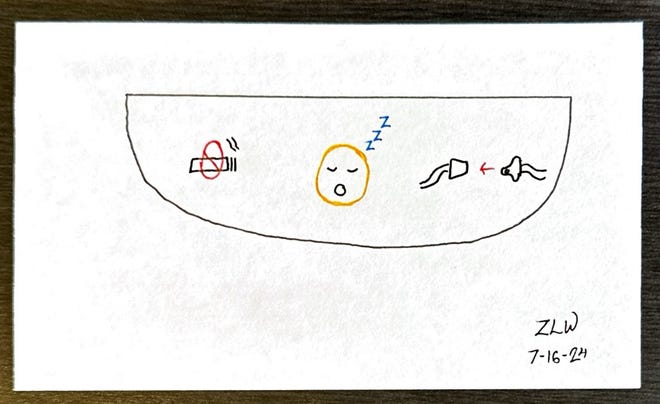- Traveling can tire us out for a variety of reasons: stress, jet lag, and changes in routine.
- Toilet habits can also be affected by travel.
- There are a few things you can do to reduce travel fatigue, such as adjusting your light exposure and activity schedule before you travel.
Travel days are tiring. Whether you’re crossing multiple time zones on a plane or driving for several hours to visit relatives, there’s a good chance you’ll be sleepy by the time you reach your destination.
As someone who takes naps whenever the opportunity arises, I always assumed my travel fatigue was just a personality trait, but it turns out it happens to just about everyone.
But why? Why does traveling from place to place leave us so exhausted? And what can we do to make travel easier?
I spoke with Charlene Gamaldo, PhD, of the Johns Hopkins Sleep and Health Center and professor and associate dean of neurology at Johns Hopkins University, who said that while everyone’s body (and brain) is different, there are some universal techniques that can make traveling easier.

Why traveling makes us tired
I travel a lot, and no matter how often I travel, I always end up feeling sleepy when I arrive at my destination. Gamaldo said that’s completely normal.
“From a circadian rhythm perspective, which direction you’re traveling and how many time zones you cross will definitely contribute to feelings of fatigue,” she said.
Traveling takes people away from their normal routines and can be stressful and exhausting.
“There can also be added anxieties that are not related to sleep, such as getting on a plane and making sure the flight isn’t canceled,” Gamaldo said.
It makes sense: whenever I’m at the airport, I’m hyper-vigilant, making sure I’m heading to the right gate, avoiding people walking slowly through the terminal, and scouring the Hudson News for my usual water bottle and pretzel purchases before boarding. By the time I’m on the plane or on the ground at my destination, I’m ready to rest.
Cruising altitude last week:Love airport lounges? Airlines are making them even better for you.
Toilet Talk
I’ve certainly noticed this myself, and several of my close friends will admit that their bathroom habits often get out of whack when they travel.
I wasn’t going to ask about this because I didn’t think it was relevant, but Gamaldo told me that bathroom behavior is also part of what causes travel fatigue.
“The big thing that people don’t necessarily understand, or don’t realize the connection in retrospect, is that GI problems are probably the most common symptom of jet lag, more so than fatigue or sleep-related issues,” she says. “Typically, this is the gut trying to adjust to this new circadian rhythm.”
Gamaldo said that keeping your stomach settled will help your body acclimate more quickly overall, meaning you’ll feel less fatigued throughout the trip.
“One of the things that helps with gut health is staying hydrated,” she says. “Staying hydrated is really important for fatigue and to help with gut motility.”
How to adjust
Whether the fatigue is caused by airport stress, an upset stomach, or just plain jet lag, there are things you can do to make travel less exhausting.
First, she says, “It’s really important to reflect on your past experiences to understand how actively you need to prepare for jet lag. If your body is prone to suffering from jet lag, you need to prepare your day for the time change.”
It’s also helpful to get into a routine while traveling — packing, traveling to the airport, arriving at your gate — which will make the whole trip less stressful and less tiring.
For regular jet lag, Gamaldo says the best way to regulate your body clock is to adjust your light exposure and activity schedule before you travel, so it can stay better regulated while you’re away.
“If you’re going back and forth between two time zones, try to get your morning light exposure two hours earlier and then get your morning light exposure two hours earlier,” she says. “This is actually the most effective way to do it in conjunction with activity.”

Gamaldo also said it’s helpful to have an idea of what your schedule will be when you arrive so you can be prepared during your trip.
“When you’re flying, if you’re arriving at your destination in the morning, you want to rest and sleep as much as possible on the plane,” Gamaldo says. “If you’re arriving close to dinner time, it’s best to forego eating on the plane if possible, and have dinner and go to sleep.”
Gamaldo also said it’s important to be diligent about giving your body time to acclimate, even on short trips, especially if you know from past experience that you’re prone to travel fatigue.
“Generally, for shorter trips, people tend to turn back sooner,” she says. “That puts a lot of strain on the body.”
Ultimately, she says, there are no real shortcuts to adapting: time, willpower, and patience are your best tools for fighting sleepiness while traveling.
“Things like melatonin may help, but the old-fashioned methods of using light and activity are the most effective ways to re-stabilize your body clock,” Gamaldo said.
Zach Wichter is a New York-based travel writer for USA TODAY. He can be reached at zwichter@usatoday.com.


